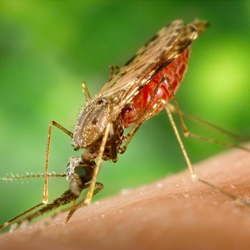
A discovery from the Center for Molecular Parasitology at Drexel University College of Medicine is offering a potential new treatment for malaria. The discovery – the development of a drug that can kill multiple stages of the parasite that causes human malaria – was part of an international study involving 16 different institutions from seven countries. The findings were recently published in Science Translational Medicine.
The Center's director, Akhil Vaidya, PhD, professor; Michael Mather, PhD, research assistant professor; and Joanne Morrisey, research instructor; all from the Department of Microbiology and Immunology, participated in the discovery that ELQ-300, an Endochin-derived drug, completely protected mice from malaria caused by the parasite Plasmodium falciparum. This parasite is transmitted to humans by infected female mosquitoes. It is the deadliest of five species of parasite that cause human malaria.
The team discovered that ELQ-300 is effective because it disrupts the parasite's mitochondrial respiration that leads to inhibition of building blocks needed for DNA synthesis. By doing so, the parasite is prohibited from multiplying, so it dies. "It works like a cyanide pill for the parasite," said Vaidya. The drug works only on the parasite's mitochondria without affecting human mitochondria. The drug is easy to make and cheap to produce making it a potential game-changer in treating malaria.
Malaria is the world's second-deadliest disease after tuberculosis. It kills anywhere from a million to 2.5 million people every year. Most of the deaths occur in children and pregnant women. Global warming and malaria's growing resistance to known drugs makes it all the more important to find new pathways to combat this disease, especially in developing countries.
"It's important to keep in mind that we constantly need to feed the drug development pipeline of anti-malarials for the foreseeable future, just to keep ahead of resistance development," adds Vaidya. "ELQ-300 is an example of such pipeline priming." The drug is set next for safety tests in animal studies. Human testing could begin in the next two years.
This research team was supported by Medicines for Malaria Venture, an international non-profit foundation, and led by principal investigator Michael Riscoe, PhD, who is a professor in the Molecular Microbiology and Immunology Department at Oregon Health Sciences University. The effort is made up of an international group of researchers from the United States, Australia, Singapore and Switzerland.